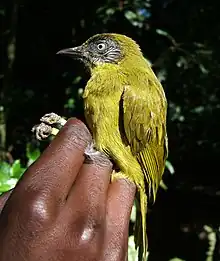| Arizelocichla | |
|---|---|
 | |
| Stripe-faced greenbul (Arizelocichla striifacies). | |
| Scientific classification | |
| Domain: | Eukaryota |
| Kingdom: | Animalia |
| Phylum: | Chordata |
| Class: | Aves |
| Order: | Passeriformes |
| Family: | Pycnonotidae |
| Genus: | Arizelocichla Oberholser, 1905 |
| Type species | |
| Xenocichla nigriceps (mountain greenbul) Shelley, 1889 | |
| Species | |
|
See text | |
 | |
Arizelocichla is a genus of greenbuls, songbirds in the bulbul family (Pycnonotidae). The genus was revived in 2010 when twelve species of bulbuls from the genus Andropadus were separated and re-classified in the genus Arizelocichla.[1]
Taxonomy
A molecular phylogenetic study of the bulbuls published in 2007 found that the genus Andropadus was polyphyletic.[2] As part of a reorganization to create monophyletic genera, 12 species from Andropadus were moved to the resurrected genus Arizelocichla that had been introduced in 1905 by the American ornithologist Harry C. Oberholser with the mountain greenbul as the type species.[3][4] The name Arizelocichla combines the Ancient Greek arizēlos meaning "conspicuous" or "admirable" with kikhlē meaning "thrush".[5]
Species
The genus contains the following 12 species:[4]
- Cameroon greenbul (Arizelocichla montana)
- Western greenbul (Arizelocichla tephrolaema)
- Kakamega greenbul (Arizelocichla kakamegae)
- Shelley's greenbul (Arizelocichla masukuensis)
- Uluguru greenbul (Arizelocichla neumanni)
- Black-browed greenbul (Arizelocichla fusciceps)
- Yellow-throated greenbul (Arizelocichla chlorigula)
- Olive-breasted greenbul (Arizelocichla kikuyuensis)
- Mountain greenbul (Arizelocichla nigriceps)
- Olive-headed greenbul (Arizelocichla olivaceiceps)
- Stripe-faced greenbul (Arizelocichla striifacies)
- Stripe-cheeked greenbul (Arizelocichla milanjensis)
References
- ↑ "Taxonomy Version 2 « IOC World Bird List". www.worldbirdnames.org. Retrieved 2017-04-02.
- ↑ Johansson, U.S.; Fjeldså, J.; Lokugalappatti, L.G.S.; Bowie, R.C.K. (2007). "A nuclear DNA phylogeny and proposed taxonomic revision of African greenbuls (Aves, Passeriformes, Pycnonotidae)". Zoologica Scripta. 36 (5): 417–427. doi:10.1111/j.1463-6409.2007.00290.x.
- ↑ Oberholser, Harry C. (1907) [1905]. "The Avian genus Blena Bonaparte and some of its allies". Smithsonian Miscellaneous Collections. 48: 149-172 [163]. Original published as Publication No. 1588 on 1 July 1905.
- 1 2 Gill, Frank; Donsker, David; Rasmussen, Pamela, eds. (January 2021). "Bulbuls". IOC World Bird List Version 11.1. International Ornithologists' Union. Retrieved 19 June 2021.
- ↑ Jobling, James A. (2010). The Helm Dictionary of Scientific Bird Names. London: Christopher Helm. p. 55. ISBN 978-1-4081-2501-4.
- Moyle, R. G., and B. D. Marks. 2006. Phylogenetic relationships of the bulbuls (Aves: Pycnonotidae) based on mitochondrial and nuclear DNA sequence data. Molecular Phylogenetics and Evolution 40: 687–695.